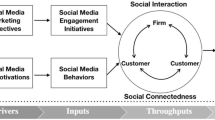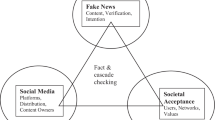Abstract
This study reports the results of a behavioral experiment in which 120 subjects were exposed to different media reports of the same monthly Bureau of Labor Statistics' unemployment reports. After reading the news stories, as reported by the CBS Evening News, The Wall Street Journal, and the Washington Post, the subjects were asked similar questions to those used in the University of Michigan's “Survey on Consumer Sentiments.” The results of the study suggest that consumer confidence may be sensitive to the selection of media source.
Zusammenfassung
Der Beitrag berichtet über eine Untersuchung individueller Unterschiede bei wirtschaftlichen Erwartungen, die nicht durch unterschiedliche wirtschaftliche Nachrichten, sondern — bei gleichlautenden Nachrichten — durch unterschiedliche Medien, über die sie vermittelt werden, hervorgerufen werden.
Die Nachrichten entstammten den monatlichen Arbeitslosenberichten der amtlichen Beschäftigungsstatistik. Insgesamt 36 Nachrichtentexte der CBS Evening News, des Wall Street Journal und der Washington Post wurden für die Untersuchung so überarbeitet, daß die konkrete Quelle und der tatsächliche Zeitraum, auf den sich die Nachricht jeweils bezog, nicht mehr erkannt werden konnte. Die so “bereinigten” Nachrichten wurden 120 Versuchspersonen (Studenten) zum Lesen vorgelegt. Anschließend wurden ihnen Fragen zur Erhebung wirtschaftlicher Erwartungen vorgelegt.
Die Ergebnisse machen deutlich, daß Unterschiede im Vertrauen auf die zukünftige wirtschaftliche Entwicklung bei gleichen inhaltlichen Nachrichten auf Unterschiede in den Nachrichtenmedien zurückgeführt werden können. Personen, die sich mehr auf Zeitungsinformationen stützten, kamen im Vergleich zu solchen, die sich eher auf das Fernsehen stützten, zu signifikant höheren Werten auf der Vertrauensskala. Dieses Ergebnis dürfte allerdings insofern verzerrt sein, als die bildliche Komponente einer Nachricht in der Untersuchung nicht berücksichtigt wurde.
Similar content being viewed by others
References
Johnson, R., & Koten, J. (1987). All the talk about a potential recession may help make the possibility a reality. The Wall Street Journal, December 2, p. 31.
Johnstone, J. W. C., Slawski, E. J., & Bowman, W. W. (1976). The news people: A sociological portrait of American journalists. Urbana, IL: University of Illinois Press.
Pruitt, S. J., Reilly, R. J., & Hoffer, G. E. (1988). The effect of media presentation on the formation of economic expectations. Journal of Economic Psychology, 9, 315–325.
Reese, S. D., Daly, J. A., & Hardy, A. P. (1987). Economic news on network television. Journalism Quarterly, 64, 137–144.
Robinson, M. J., & Kohut, A. (1988). Believability and the press. Public Opinion Quarterly, 52, 174–189.
Robinson, M. J., & Sheehan, M. A. (1983). Over the wire and on TV: CBS and UPI in Campaign' 80. New York: Russell Sage Foundation.
Additional information
Stephen W. Pruitt is Assistant Professor in the Graduate School of Business, Indiana University, Bloomington, IN 47405, USA. George E. Hoffer is Professor in the Department of Economics, School of Business, Virginia Commonwealth University, Box 4000, Richmond, VA 23284-4000, USA.
The authors are grateful to the Faculty Grant-In-Aid Program at Virginia Commonwealth University for funding.
Rights and permissions
About this article
Cite this article
Pruitt, S.W., Hoffer, G.E. Economic news as a consumer product: An analysis of the effects of alternative media sources on the formation of consumer economic expectations. J Consum Policy 12, 59–69 (1989). https://doi.org/10.1007/BF00411389
Issue Date:
DOI: https://doi.org/10.1007/BF00411389




